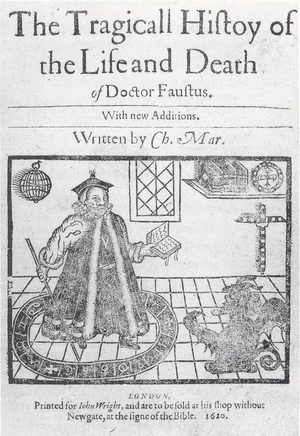Original Pronunciation: Dr Faustus by Christopher Marlowe
An original pronunciation reading of Doctor Faustus, Presented by Passion in Practice
22 May 2016, Sam Wanamaker Playhouse
Review by Shehrazade Zafar-Arif, MA Shakespeare Studies, King’s College London

Christopher Marlowe's 'Dr Faustus'
Christopher Marlowe’s 'The Tragical History of the Life and Death of Doctor Faustus', or more commonly known as 'Doctor Faustus', follows the titular Faustus, a scholar who strikes a bargain with the devil in pursuit of knowledge and power.
The Sam Wanamaker Playhouse seemed a perfect venue for such a dark, magical play: beautiful but small and encased like a box, the darkness lit through with candles. That day it was taken over by Ben Crystal and his theatre company, Passion in Practice, which focuses on performing Shakespeare and his contemporaries in original pronunciation. The practice of original pronunciation involves speaking the lines using the English pronunciation that would have been used during the time of the original performance. This is hardly as alarming as it sounds – even to a layman listener, it is almost perfectly understandable, and soon one gets into the flow of the occasional odd pronunciation of words.
The set included a desk and chair, piled with books, as the centre of focus. This created a narrowness of scope, a sense of being trapped in the little study with Faustus, reinforced by the theatre’s size. Much of the play was cut down, restricting it to the scenes in Faustus’s study and emphasising the sense of claustrophobic containment – the sense, David Crystal noted, that we are all in hell. The cost of this cutting and splicing is the loss of the play’s absurd, comedic scenes, which include Faustus pulling pranks on the Pope and two servants being transformed into a dog and an ape. However, the play seems to make up for this by drawing out the text’s other, darkly comedic potential, eliciting laughs from the audience through Faustus’s exaggerated Latin incantations and Mephistopheles’s attempt at seduction.
A point of contention might be the production’s neglect of the play’s use of spectacle and the magical tricks, parade of devils, illusions and transformation sequences are either downplayed or dropped. This creates a sense, especially for those familiar with the play, of wasted potential – there is so much that could have been done with the candles alone, for instance. However, one can argue that the point of this particular production was to focus on the language and the psychological rather than the physical effects on Faustus of his bargain.
The method of staging also led to some interesting results. The cast was small, which meant there was constant doubling of all the actors except for Faustus himself, adding to the chaotic sense that reality and illusion were blurring together. Mephistopheles and the Bad Angel were both played by women, a fitting creative choice for a play that features no speaking female parts. The actors had also had little time to rehearse, which meant a lot of their creative choices were improvised. They had their scripts in hand, and made no effort to either conceal or emphasise them, instead using them like props, such as passing each other sheets of paper or reading from books.
The performance was followed by a question and answer session with Ben and David Crystal, and the actors and creative team, which was fascinating and informative. They pointed out how each time they did a play in OP, they discovered something new about the text. Indeed, the original pronunciation seems to bring out the puns and rhymes of the text, which we might otherwise miss, and creates a visceral rhythm and energy that feeds into performance. Experimental performances are often hit and miss, but this one succeeded in providing a new approach to a play that has been performed countless times before.

